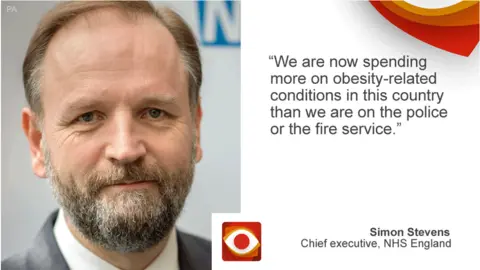Reality Check: Does obesity cost more than police and fire service?
 BBC
BBCThe claim: More money is spent on the health impact of obesity than on the police and fire services.
Reality Check verdict: This claim made in 2016 is based on research that double-counted the costs of obesity-related diabetes and included the costs of types of diabetes that are not caused by obesity.
Coordinated by campaigning chef Jamie Oliver, the leaders of the Labour Party, Scottish National Party, Liberal Democrats and Green Party sent a letter to the prime minister on Wednesday calling for a comprehensive strategy to tackle childhood obesity.
It included the claim: "According to the head of NHS England, more money is being spent dealing with the health impact of obesity than is spent on the fire and police services combined."
This refers back to a claim made by NHS England chief executive Simon Stevens to the Commons Health Select Committee on 6 June 2016.
NHS England referred Reality Check to a 2014 report on the costs of obesity from the consultants McKinsey, which made a slightly different claim: "The cost of obesity and diabetes to the healthcare system is equivalent to the United Kingdom's combined 'protection' budget for the police and fire services, law courts, and prisons."
 Getty Images
Getty ImagesThe usual figure given by Public Health England (PHE) for the cost of obesity in England is £6.1bn per year.
But to make this claim, McKinsey has combined the cost of obesity with the cost of diabetes. It breaks the figures down into £6bn in the UK on obesity and another £10bn on the cost of treating diabetes.
The £6bn figure is derived from a 2011 academic paper, which put the figure at £5.1bn for the UK, although that covered both obesity and being overweight (which aren't the same thing).
One of the authors of that paper, Peter Scarborough from Oxford University, told Reality Check that there would have been some double-counting in the combining of the £6bn and the £10bn because his report had also included the cost of treating obesity-related diabetes.
He also pointed out that not all of the £10bn would have been obesity-related: type 1 diabetes, for example, is not caused by obesity.
So the £16bn figure is too high because it involves the double-counting of obesity-related diabetes costs and also includes costs of non-obesity related diabetes.
Now let's look at the figures it was being compared with.
Simon Stevens and the letter both compared obesity costs with the police and fire service. For England that comes to a figure of about £13bn. For the whole of the UK it's just over £15bn.
Turning to McKinsey's comparison with police, fire, law courts and prisons, for the UK that's about £24bn, so significantly more than the £16bn for obesity and diabetes. McKinsey told Reality Check they had only been talking about central government spending, which adds up to just over £15bn according to this website that they pointed us towards.
But these figures count the police block grant as part of local government spending, even though it's money provided by central government to local police forces.
UPDATE 1 May: When Reality Check asked NHS England for the figures behind Simon Stevens' claim we were pointed towards the McKinsey research. Following publication, NHS England pointed us towards separate research from the LSE, that suggested the cost of treating type 2 diabetes in the UK in 2010 was £11.7bn, which would raise the costs above the police and fire service. There is uncertainty about all of these estimates because the NHS does not collect or calculate figures for the cost of diabetes itself.



